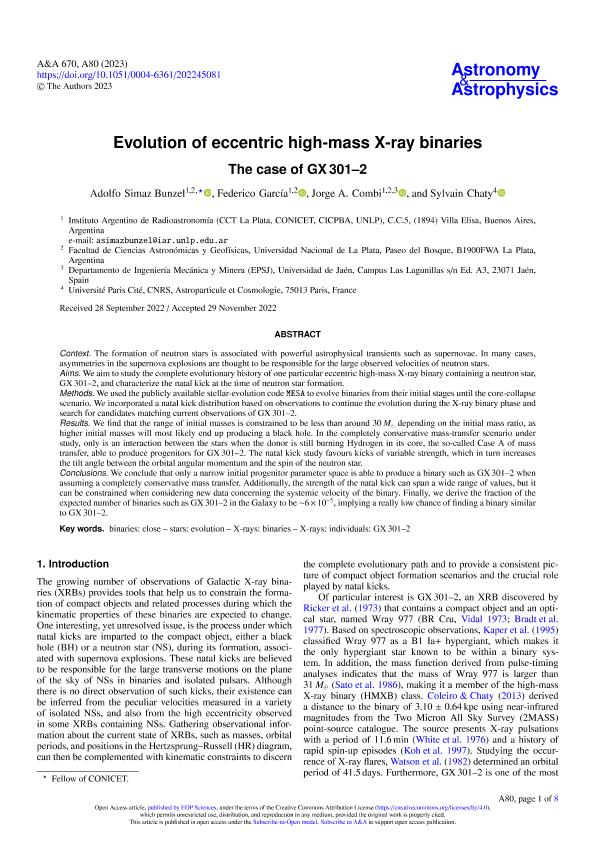Artículo
Evolution of eccentric high-mass X-ray binaries: The case of GX 301-2
Fecha de publicación:
02/2023
Editorial:
EDP Sciences
Revista:
Astronomy and Astrophysics
ISSN:
0004-6361
Idioma:
Inglés
Tipo de recurso:
Artículo publicado
Clasificación temática:
Resumen
Context. The formation of neutron stars is associated with powerful astrophysical transients such as supernovae. In many cases, asymmetries in the supernova explosions are thought to be responsible for the large observed velocities of neutron stars. Aims.We aim to study the complete evolutionary history of one particular eccentric high-mass X-ray binary containing a neutron star, GX301-2, and characterize the natal kick at the time of neutron star formation. Methods.We used the publicly available stellar-evolution code MESA to evolve binaries from their initial stages until the core-collapse scenario. We incorporated a natal kick distribution based on observations to continue the evolution during the X-ray binary phase and search for candidates matching current observations of GX301-2. Results. We find that the range of initial masses is constrained to be less than around 30 M_ depending on the initial mass ratio, as higher initial masses will most likely end up producing a black hole. In the completely conservative mass-transfer scenario under study, only is an interaction between the stars when the donor is still burning Hydrogen in its core, the so-called Case A of mass transfer, able to produce progenitors for GX301-2. The natal kick study favours kicks of variable strength, which in turn increases the tilt angle between the orbital angular momentum and the spin of the neutron star. Conclusions. We conclude that only a narrow initial progenitor parameter space is able to produce a binary such as GX301-2 when assuming a completely conservative mass transfer. Additionally, the strength of the natal kick can span a wide range of values, but it can be constrained when considering new data concerning the systemic velocity of the binary. Finally, we derive the fraction of the expected number of binaries such as GX301-2 in the Galaxy to be _6∗10-5, implying a really low chance of finding a binary similar to GX301-2.
Palabras clave:
BINARIES
,
BINARIES - X-RAYS
,
CLOSE - STARS
,
EVOLUTION - X-RAYS
,
GX301-2
,
INDIVIDUALS
Archivos asociados
Licencia
Identificadores
Colecciones
Articulos(IAR)
Articulos de INST.ARG.DE RADIOASTRONOMIA (I)
Articulos de INST.ARG.DE RADIOASTRONOMIA (I)
Citación
Simaz Bunzel, Adolfo; García, Federico; Combi, Jorge Ariel; Chaty, Sylvain; Evolution of eccentric high-mass X-ray binaries: The case of GX 301-2; EDP Sciences; Astronomy and Astrophysics; 670; A80; 2-2023; 1-8
Compartir
Altmétricas




